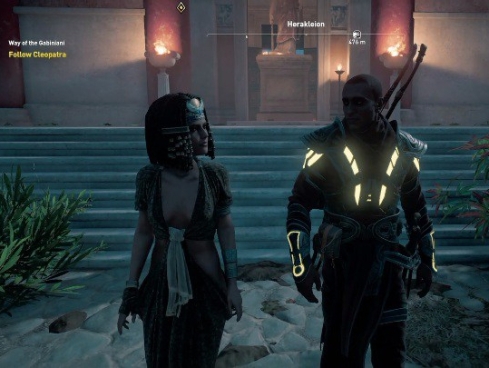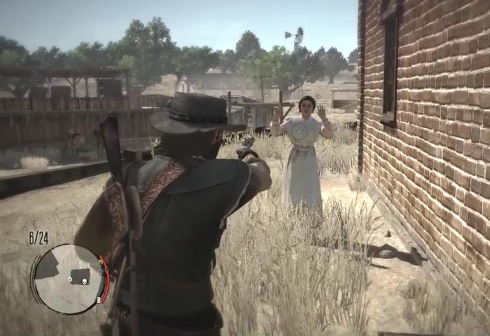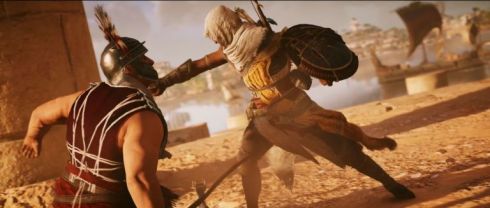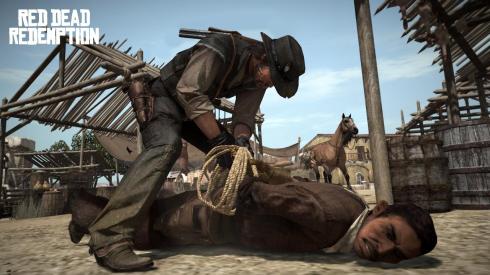My usual development blogs are going to be interrupted today by a quick game analysis. In this post, I’ll be taking a look at Assassin’s Creed: Origins and Red Dead Redemption and comparing how these two games handle narrative. These games share a lot of similarities, for example, both games are third-person action-adventure games that have an expansive open-world for players to explore. This means that these games have to deliver the story in a careful and intentional way so players don’t get confused if they explore beyond the golden-path areas. However, these games handle their story experience in very different ways so I’m excited to dive into a narrative comparison for both of these titles. Let’s get started.
Intent
Assassin’s Creed: Origins

The intent of ACO is to make players feel the pain that Bayek (the main character) feels after losing his son. Throughout the game, Bayek’s pain turns to anger as he learns more about the effect that the Order of Ancients (the people responsible for his son’s death) has had on his hometown, and eventually, all of Egypt. Empathy is used strongly throughout the game to make the player feel what Bayek feels and paint the Order of Ancients in a truly evil light.
Obviously, this is an Assassin’s Creed game. This means that it can safely be assumed that the developers wanted to offer some reason to the player that convinces them these enemies are worth assassinating. This game creates that feeling really well, because, with each kill, the player feels this sense of heroism, as if they really are making the world a better place, one job at a time.
Red Dead Redemption

RDR has a very similar intent. The game opens up and we learn that John Marston’s family has been taken as collateral by the Bureau of Investigation until he successfully finds his old gang members who are still at large. The difference here is that Red Dead Redemption offers this thread of hope to the player, promising them closure at the end of their mission. John Marston knows his family is alive, all he has to do is find and take down the men he used to work alongside to get back to the normal life he tried to build.
While ACO uses the memory of Bayek’s son to draw the player in emotionally, RDR never shows any glimpse of John Marston’s family life. Because of this, the safety of Marston’s sits in the back of the mind of the player for most of the game, and never really offers an emotional connection for the player to hold on to. Instead, players are motivated by the viciousness of their enemies and the rough and tumble nature of the wild west, to take down the bad guys by any means necessary.
Creating Narrative
Assassin’s Creed: Origins
The golden-path story for ACO is told in a very linear format. Even though the game is completely open to explore, the story will only unfold if the player follows the mission path that’s been laid out for them. The story is mainly delivered to the player through quest dialogue or cutscenes. After playing all of ACO, I’ve determined that the story is split into three acts. The first act is all about discovery. This is when Bayek’s world is small and his only goal is to find and kill the men he believes were involved in his son’s death. This act quickly comes to a close when Bayek travels to Alexandria to meet his wife, Aya, and Cleopatra, who reveal to him that there are more men involved than they originally expected. Act 2 is when Bayek sets out into the world to take down the rest of the Order of Ancients. Act 2 ends and Act 3 begins when Rome gets involved, and Bayek and Aya are betrayed by Cleopatra.

Along the way, Bayek meets several other characters. Some of them assist Bayek in his mission while others try to drag him down. This diverse cast of NPCs helps create a significant amount of depth for the world the player is exploring. Act 2 is really when the game becomes less about Bayek’s own mission for revenge and more about the struggles of the people of Egypt. People all around the country are facing new problems every day, and Bayek is determined to be a savior for all of them. ACO offers perspective to the player, by delivering the narrative through the stories of all these different people. Playing this game is almost like trying to put a puzzle together, and each piece gives the player more information about the organization that Bayek is set on tearing down.
Red Dead Redemption
RDR’s golden path is also told in a linear format, but unlike ACO, the game world expands as the player learns more of the story. Players don’t have access to everything right from the beginning. The world is split into three regions: New Austin, Nuevo Paraiso, and West Elizabeth. As the player transitions into a new act of the narrative, a new region is unlocked for the player to explore. What’s interesting about this story is that the player is left unaware of what will be the last thing they have to do until they get to the very end. Since the world seems to expand the more the player progresses, it’s hard to tell when the story is actually going to come to a close.

Similiar to ACO, most of the narrative is delivered to the player through interactions with NPCs and quest dialogue. The difference here is that with ACO, players are aware of what their end goal is from very early on, whereas in RDR players are only given a vague idea of what to expect and are given a little more of the context with each step they take. The problem with delivering the story with this method is that it forces all of the events in this world to revolve around John Marston, therefore, making the world seem rather shallow. It’s like everything gets put on pause if the player isn’t around.
Expectations
Assassin’s Creed: Origins
Player expectations are pretty clear for an Assassin’s Creed game. Most players are familiar with the usual format of some person from our time using Animus technology to access the memories of their ancestor, who is always an assassin. The assassin is usually tasked with taking down members of the Templars who are the sworn enemies of the Assassin’s Creed. Players know that they’re going to be responsible for assassinating a few high members of the Templars and retrieving the ancient technology that the Templars want to exploit for their own personal game. The pattern has been done plenty of times for most players to know all of this before even starting the game. ACO follows this structure very closely, the only difference is that in the place of the Templars, we have the Order of Ancients.

ACO offers a player experience that aligns very closely with player expectations. Ubisoft even iterated on a few key mechanics that have been in every AC game previously to enhance their intended experience and let players be as stealthy as they want to be, as long as they plan accordingly. In the end, ACO is meant to be an action-adventure game with a strong emphasis on stealth gameplay and it certainly succeeds in creating this experience for players. However, the narrative doesn’t enhance this experience at all. The game’s story could have been totally different, but the actual gameplay experience wouldn’t feel different at all.
Red Dead Redemption
Given Rockstar’s typical game experience, players expected this game to have a wide open-world and allow the player to be as violent as they want to be. What players didn’t expect, was a morality system. The morality system in RDR changes everything. All of a sudden, John Marston’s reputation is on the line and the choices the player makes affect how the world reacts to him. The downfall of the morality system is that when it comes to the golden-path, John Marston’s reputation doesn’t affect the outcome of these situations at all. In the end, players can kill as many innocent people as they want, but they’ll still be pardoned for their crimes as long as they do what the Bureau of Investigation tells them to do.

Given all of the other systems available to the player, the game still delivers an experience that players were expecting. Players get to feel like a real cowboy in the gritty and unforgiving wild west. However, because of the shallowness of most of the characters that players meet along the way, it’s difficult to feel connected to any of them. While I was playing, I found that I had a stronger connection with my horse than I did with any of the other NPCs I had met throughout the game.
Success
Assassin’s Creed: Origins
After releasing only a few months ago, ACO has been an incredibly successful game. An article in Forbes announced that Assassin’s Creed: Origins sales are already double AC: Syndicate’s sale numbers (Tassi). Personally, I loved the game and after polling a significant number of my peers, it seems like a lot of other players share my feelings. However, I feel like the success of ACO has very little to do with the game’s narrative. Speaking from my experience, the game is successful because of the iteration of well-known systems, the player’s opportunity to explore new areas of the world, and always having things to do no matter where the player chooses to travel. I can say that the narrative did assist in creating a lot of depth for the world, which always made exploring the world worth it. Whether I’m saving a group of civilians from a military base or exploring the depths of an ancient tomb, new information always presents itself in the end.
Red Dead Redemption
Red Dead Redemption is a much older game than Assassin’s Creed: Origins. However, after Rockstar announced two years ago that RDR would be playable on the Xbox One through backward compatibility, sales launched up 6329% and quickly became the 17th most popular game on Amazon in 2016 (Hussain). I played the game for the first time this past summer, 7 years after the game’s initial release and I was still very impressed with my whole experience. I’m going to sound like a broken record when I say this though, I don’t think RDR’s narrative led to its success either. Just like with ACO, RDR offers an amazing open world with new and exciting game systems that have drawn players in for some time now. The difference with RDR is that the narrative doesn’t offer any more depth for the world. The game could have been totally differenly, narratively, but absolutely nothing would change. In this game, the narrative is really just icing on the cake, whereas in ACO, the narrative at least offers a richer flavor. So while the game is successful, narrative had nothing to do with it.
